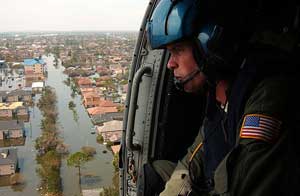During the campaign Obama pledged to make the Gulf Coast recovery a paramount goal.
In February, 2008, he declared, “The broken promises did not start when a storm hit, and they did not end there … I promise you that when I’m in the White House I will commit myself every day to keeping up Washington’s end of this trust. This will be a priority of my presidency.”
But a new study [PDF] by the Institute of Southern Studies reports that 50 community leaders from areas affected by the hurricane ranked Obama only slightly better than Bush in reconstruction. In a range of different categories, Obama came out with a D+ to Bush’s D.
According to the report, “A diverse group of more than 50 community leaders were asked in August 2009 to grade the Obama administration’s efforts for Gulf Coast recovery in eight key areas. The respondents came from Alabama, Louisiana, Mississippi and Texas, and represented a wide range of constituencies, including faith, community and environmental organizations.”
The demographics assembled by the Institute in themselves reflect how little has been done to restore life along the coast:
- Estimated number of U.S. residents displaced by Hurricane Katrina: 1 million
- Rank of Katrina’s among all diasporas in U.S. history: 1
- Estimated number of people displaced by Katrina still living in Houston today: 100,000
- Percent of New Orleans’ pre-Katrina addresses that are actively receiving mail today: 76.4
- Percent receiving mail in the largely African-American and working-class Lower 9th Ward: Less than 49
- Percent of households with children in New Orleans before Katrina: 30
- Percent shortly after the storm: 18
- Percent two years later: 20
- Percent of New Orleans’ pre-Katrina population that was African-American: 67
- Percent three years later: 61
- Number of abandoned residential addresses in New Orleans today: 65,888
- Proportion of all residential addresses in the city that number represents: 1/3
- Rank of New Orleans among all U.S. cities for the rate of abandoned residences: 1
- Number of 2010 federal census questionnaires slated to be hand-delivered to homes in south Louisiana in an effort to ensure an accurate count: 300,000
- Average amount of federal funds states receive over a decade for each person counted in the census: $12,000










